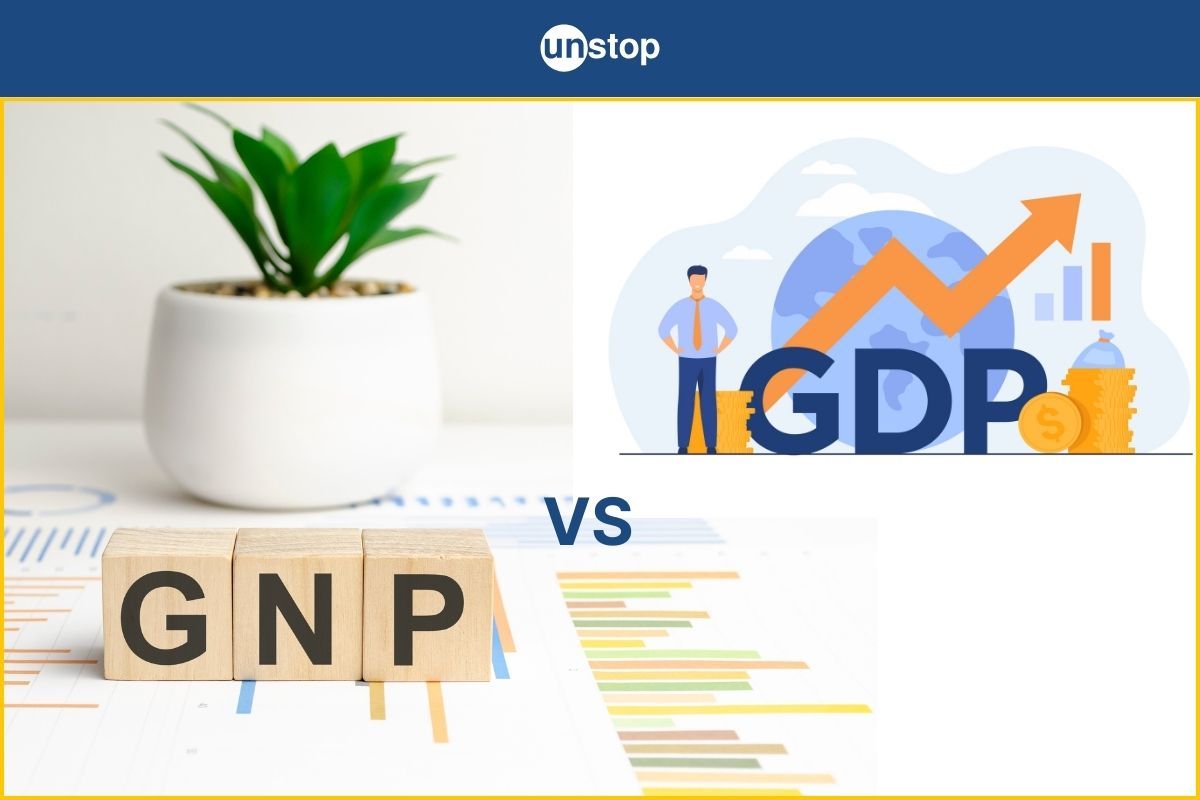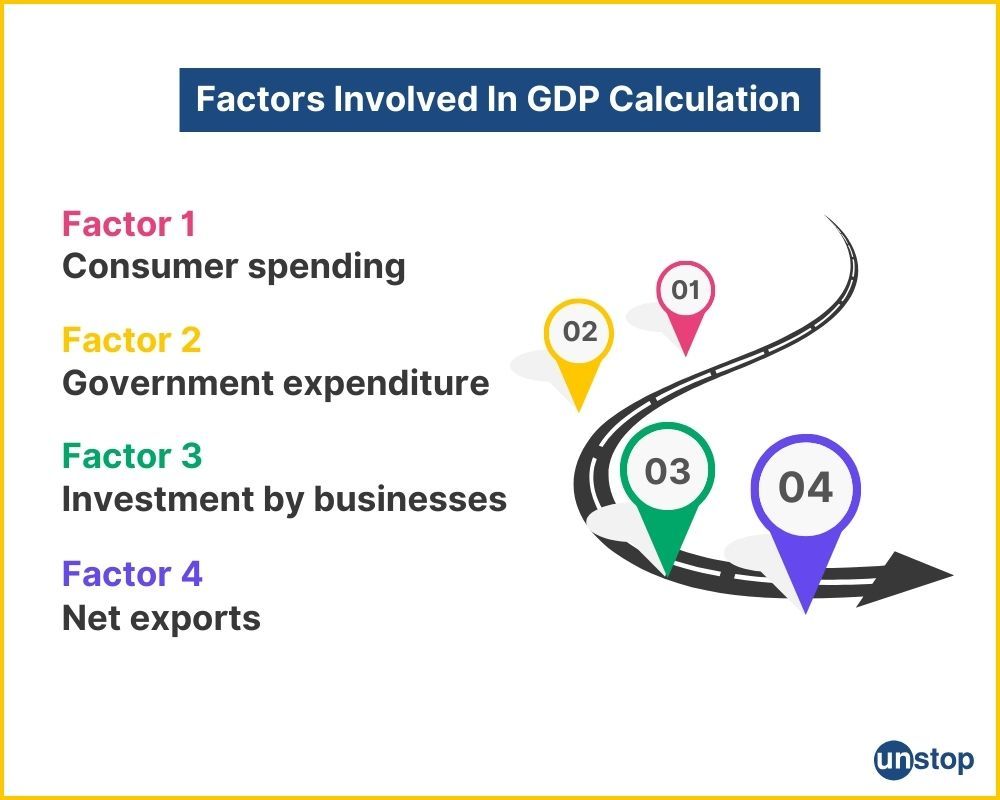- Definition Of GDP
- Definition Of GNP
- GDP Vs GNP
- Difference Between GDP And GNP
- How GDP & GNP Are Calculated?
- Examples Of GDP & GNP
- When Is GNP More Useful Than GDP?
- Frequently Asked Questions (FAQs)
Difference Between GDP And GNP Explained With Examples

Understanding the difference between GDP and GNP is critical when analyzing a nation's economic performance. GDP, or Gross Domestic Product, takes into account the total value of all the goods and services generated within a country's borders, regardless of who owns the production factors. On the other hand, GNP, or Gross National Product, considers domestic production and income generated by a country's residents abroad. By grasping this distinction, individuals can gain insights into a nation's economic activities and determine its overall growth and development. This article comprehensively summarizes GDP and GNP, highlighting their definitions and significance. It also explores real-world examples to illustrate how these terms are calculated and utilized in economic analysis.
Definition Of GDP
Assessment of the economic output and overall economic activity of a country is done by using the Gross Domestic Product (GDP). It provides valuable insights into the size and growth of an economy, as well as the standard of living within a country. GDP is calculated by considering the total market value of all the goods and services generated within a country's borders during a specific time period.

The primary purpose of GDP is to gauge a country's economic growth level. Comparing GDP figures over time, economists can ascertain if an economy is expanding or contracting. GDP per capita (which divides GDP by the population) provides insights into the average standard of living in a nation. Let us look at the pros and cons of GDP provided in the table below:
|
Pros |
Cons |
|
GDP offers a comprehensive view of an economy's performance by taking into account all major economic activities |
While GDP measures the total output of an economy, it does not consider how that wealth is distributed among individuals or groups |
|
It helps identify how efficiently resources are being utilized within a country |
Certain essential activities like household work or volunteer work are not included in GDP calculations since they do not involve monetary transactions |
|
GDP allows for comparisons between different countries' economies, aiding in understanding global disparities |
Although GDP reflects economic activity, it fails to capture aspects such as environmental sustainability or social well-being |
Definition Of GNP
Gross National Product (GNP) is another important economic indicator that complements Gross Domestic Product (GDP). GNP takes into account the income earned by residents of a country both domestically and abroad. In simpler terms, GNP provides a broader view of a nation's economic performance. It takes into account not only the production occurring within its borders but also the contributions made by its residents globally. GNP looks at the economic output generated by a country's residents regardless of their location.

Image credit: Freepik
This means that even if citizens or businesses are operating outside the country, their contributions to the economy are still considered in calculating the GNP. For example, if a multinational corporation owned by citizens of Country A earns profits from its operations in Country B, those earnings would be included in Country A's GNP.
By considering income generated both domestically and internationally, GNP offers a more comprehensive understanding of a nation's economic performance. This broader perspective allows policymakers to assess how well their citizens are faring economically on a global scale and can help identify areas for potential growth and development.
GDP Vs GNP
Two important economic terms often get thrown around, namely Gross Domestic Product (GDP) and Gross National Product (GNP). While they may sound similar, there are key distinctions between the two that are worth exploring.
|
GDP |
GNP |
|---|---|
|
GDP is the total value of all goods and services generated within a country's borders in a specific time period |
GNP is the total value of all goods and services generated by the residents of a country, regardless of where they are located, in a specific time period |
|
GDP is calculated by adding up investment, consumption, government spending, and net exports (exports minus imports) |
GNP is calculated by adding up GDP and any income earned by residents from investments or work abroad and subtracting any income earned by non-residents within the country |
|
GDP focuses on the production within a country's borders |
GNP focuses on the production by a country's residents, regardless of location |
|
GDP considers only the production that occurs within a country's borders, regardless of who is doing the production |
GNP considers the production by a country's residents, regardless of where it takes place |
|
GDP is often used as an indicator of a country's economic health and standard of living |
GNP can provide insights into a country's economic relationships with other countries and the well-being of its residents |
|
GDP does not take into account income earned by residents from investments or work abroad or income earned by non-residents within the country |
GNP does not consider production that occurs within a country's borders by non-residents |
|
If a foreign-owned company produces goods within a country's borders, it would contribute to the country's GDP but not GNP |
If a country's residents earn income from investments or work abroad, it would contribute to GNP but not GDP |
Reflects Different Aspects Of Economic Performance
Both GNP and GDP serve as indicators of an economy's performance; however, they provide different insights due to their distinct perspectives. GDP offers valuable information about the overall economic activity occurring within a country. It helps policymakers assess factors such as consumer spending, investments, government expenditure, and net exports. This data enables them to make informed decisions regarding economic policies and strategies.
On the other hand, GNP provides insight into how well a country's residents are performing economically on a global scale. It takes into account the income secured by citizens abroad and highlights their contribution to the national economy. This information can be useful in assessing a country's international competitiveness and the impact of its residents' economic activities beyond its borders.
Difference Between GDP And GNP
To understand the difference between GDP and GNP, it is important to consider a few key points.
GDP Excludes Income From Foreign Sources
One of the main differences between GDP and GNP lies in how they account for income from foreign sources. GDP only takes into account the economic output produced within a country's borders, regardless of whether it is generated by domestic or foreign entities. On the other hand, GNP includes both domestic and foreign income earned as income by residents of a country.
For example, let's say there is a multinational company based in country A that generates significant revenue from its operations abroad. When calculating GDP for country A, only the value of goods and services generated within its borders would be considered. However, when calculating GNP, the income generated by the multinational company abroad would also be included.
GNP Accounts For Remittances From Citizens Working Abroad
Another notable difference between GDP and GNP is their treatment of remittances. Remittances refer to money sent back home by citizens who are working abroad. These funds play an important role in many economies as they contribute to household incomes and overall economic growth.
While GDP does not take into account remittances received from citizens working abroad, GNP considers this inflow of funds as part of its calculation. This means that when calculating GNP, the money sent back home through remittances would be included as an additional source of income for the country.
How GDP & GNP Are Calculated?
In terms of calculation, there is a difference between GDP and GNP as well. GDP can be calculated using either the expenditure approach or the income approach. On the other hand, GNP can be calculated by adding up GDP and net income from abroad.
Factors Included In Calculation
The calculation of both GDP and GNP involves several factors that provide insight into the economic performance of a country. It measures the total value of all goods and services generated within a country's borders during a specific period. This includes consumer spending, government expenditure, investment by businesses, and net exports (exports minus imports).

On the other hand, GNP takes into account not only domestic production but also the income generated by a country's residents, regardless of whether they are located within the country or abroad.
Examples Of GDP & GNP
To better understand the difference between GDP and GNP, let's take a look at some examples that illustrate how these measures are used to assess the economic performance of a country.
GDP Example
For instance, imagine we want to determine the economic output of an imaginary country called Carlandia for one year. To calculate its GDP, we would consider the value of all cars manufactured within Carlandia's boundaries during that time frame. This includes both domestically-owned car manufacturers and foreign-owned ones operating within Carlandia.
GNP Example
Gross National Product (GNP), on the other hand, takes into account not only domestic production but also income generated by citizens abroad. Suppose we want to evaluate Carlandia's GNP for one year. In this case, we would consider both the income earned by residents working within Carlandia and any income generated by Carlandian citizens working abroad. This means that if Carlandian citizens work overseas and send money back home, it contributes to their country's GNP.
It is important to note that both GDP and GNP are measured in monetary terms, typically in the currency of the respective country being assessed. These measures provide valuable insights into a nation's economic health and can be used to compare different countries' economic performances over time.
When Is GNP More Useful Than GDP?
Assessing the impact of international trade on a nation's economy is one area where Gross National Product (GNP) proves to be more useful than Gross Domestic Product (GDP). GNP takes into account not only the value of goods and services generated within a country's borders but also includes income earned by its citizens abroad. This makes it an excellent indicator for countries heavily involved in international trade. GNP becomes particularly relevant for countries with significant emigration or foreign investments. It helps us understand how global factors affect a nation's overall economic well-being. By considering the income earned by its citizens abroad, GNP provides a more comprehensive view of a country's economic activity and prosperity.
Let's explore why GNP is more useful than GDP in these specific scenarios:
Assessing The Impact Of International Trade
Unlike GDP, which only considers domestic production regardless of who benefits from it, GNP accounts for income earned by residents outside the country. This means that if a country has many multinational corporations operating overseas or if its citizens are earning substantial amounts from foreign investments, their contributions will formed as part of the calculation of GNP. Thus, GNP gives us a clearer picture of how international trade affects a nation's overall economic performance.
Countries With Significant Emigration Or Foreign Investments
For countries experiencing high levels of emigration or receiving substantial foreign investments, GNP becomes an essential metric. Emigrants often continue to earn income while living abroad and may send remittances back to their home countries. By incorporating this income into the calculation, GNP captures the economic contribution made by emigrants and provides a more accurate representation of their impact on their home country's economy.
Likewise, when foreign investors contribute significantly to a nation's economy through capital inflows or direct investments, GNP takes into account the income generated by these investments. This allows policymakers and analysts to assess the true economic benefits derived from foreign investment and make informed decisions regarding economic development strategies.
Understanding Global Factors' Impact On Economic Well-Being
GNP offers a broader perspective on how global factors influence a country's overall economic well-being. By considering income earned abroad, it captures the effects of globalization, international trade, and foreign investments on a nation's economy. This is particularly important in today's interconnected world, where countries are increasingly reliant on global markets for their economic growth.
Conclusion
In conclusion, knowing the difference between GDP and GNP highlights the different ways in which economic activity is measured within a country. While GDP looks at the value of goods and services generated within a country's borders, GNP takes into account the income generated by its residents, both domestically and abroad. Both indicators provide valuable insights into a country's economic performance, but it is important to consider their limitations and use them in conjunction with other measures to gain a comprehensive understanding of an economy. By analyzing both GDP and GNP, policymakers and analysts can make more informed decisions and develop effective strategies to promote economic growth and development.
Frequently Asked Questions (FAQs)
1. What is the full form of GDP and GNP?
The full form of GDP is Gross Domestic Product, while the full form of GNP is Gross National Product. Both economic indicators are used to measure a country's economic performance. While they are similar, there are key differences between them.
2. How does GDP differ from GNP?
The difference between GDP and GNP is that the former takes into account the total value of all the goods and services generated within a country's borders, regardless of who owns the production factors. On the other hand, the latter takes into account the total value of all goods and services produced by a country's residents, regardless of where they are located.
3. Why do we need both GDP and GNP?
Both GDP and GNP provide valuable insights into an economy. GDP reflects the economic activity within a country's borders, while GNP takes into account the earnings of its residents worldwide. By considering both indicators, we gain a more comprehensive understanding of a nation's economic strength.
4. How can GDP and GNP be used to evaluate an economy?
Evaluating an economy requires analyzing various factors, including GDP and GNP. These indicators help determine the size, growth rate, and overall health of an economy. By comparing changes in these figures over time or across different countries, policymakers can make informed decisions to promote economic development.
5. Which indicator is more important: GDP or GNP?
Neither indicator is inherently more important than the other; their significance depends on the specific context. However, for most countries, GDP is commonly used as it provides a snapshot of domestic production within national borders. Nonetheless, examining both indicators together offers a more comprehensive assessment.
Suggested reads:
Instinctively, I fall for nature, music, humor, reading, writing, listening, traveling, observing, learning, unlearning, friendship, exercise, etc., all these from the cradle to the grave- that's ME! It's my irrefutable belief in the uniqueness of all. I'll vehemently defend your right to be your best while I expect the same from you!
Login to continue reading
And access exclusive content, personalized recommendations, and career-boosting opportunities.
Subscribe
to our newsletter















Comments
Add comment